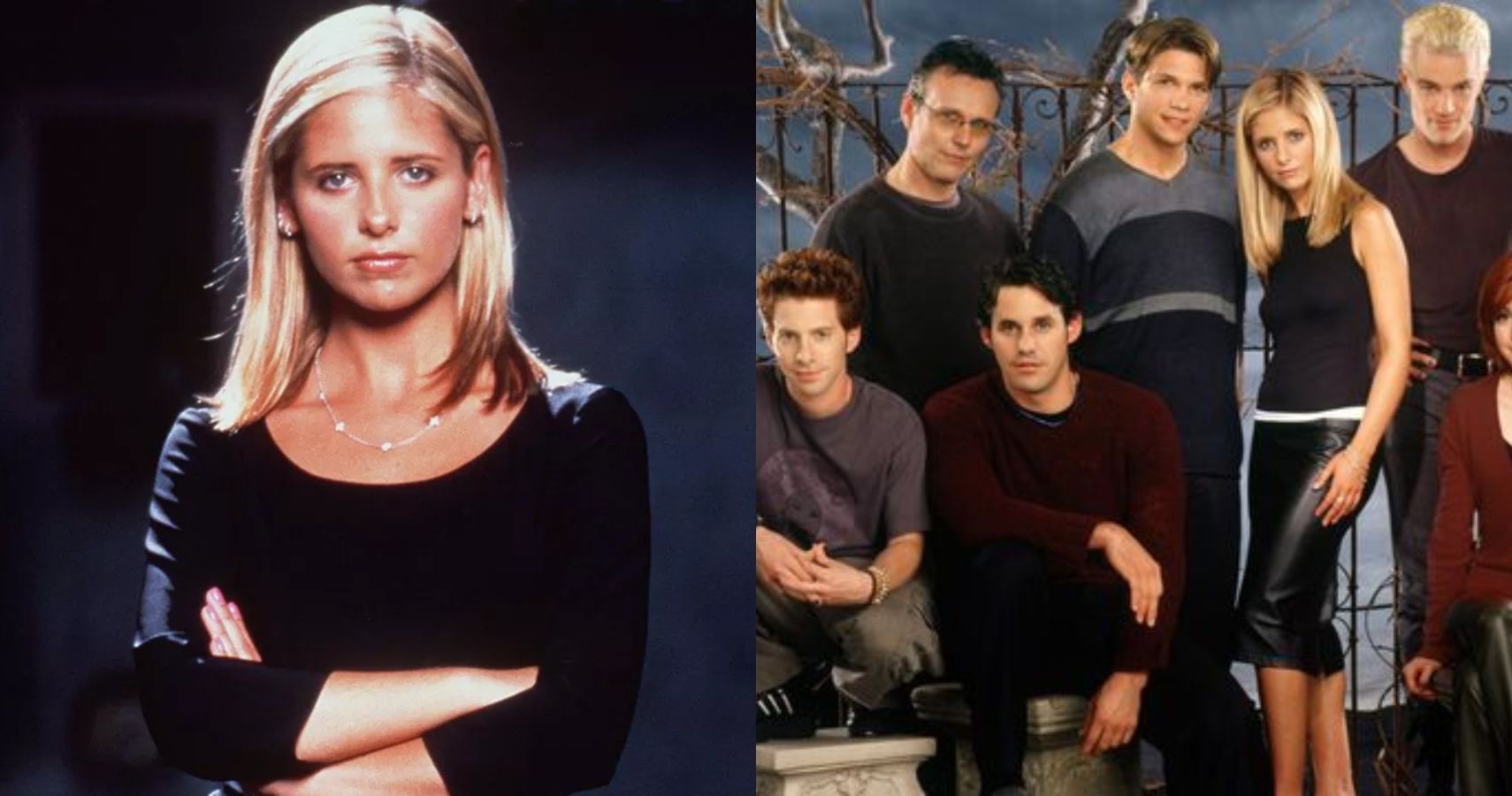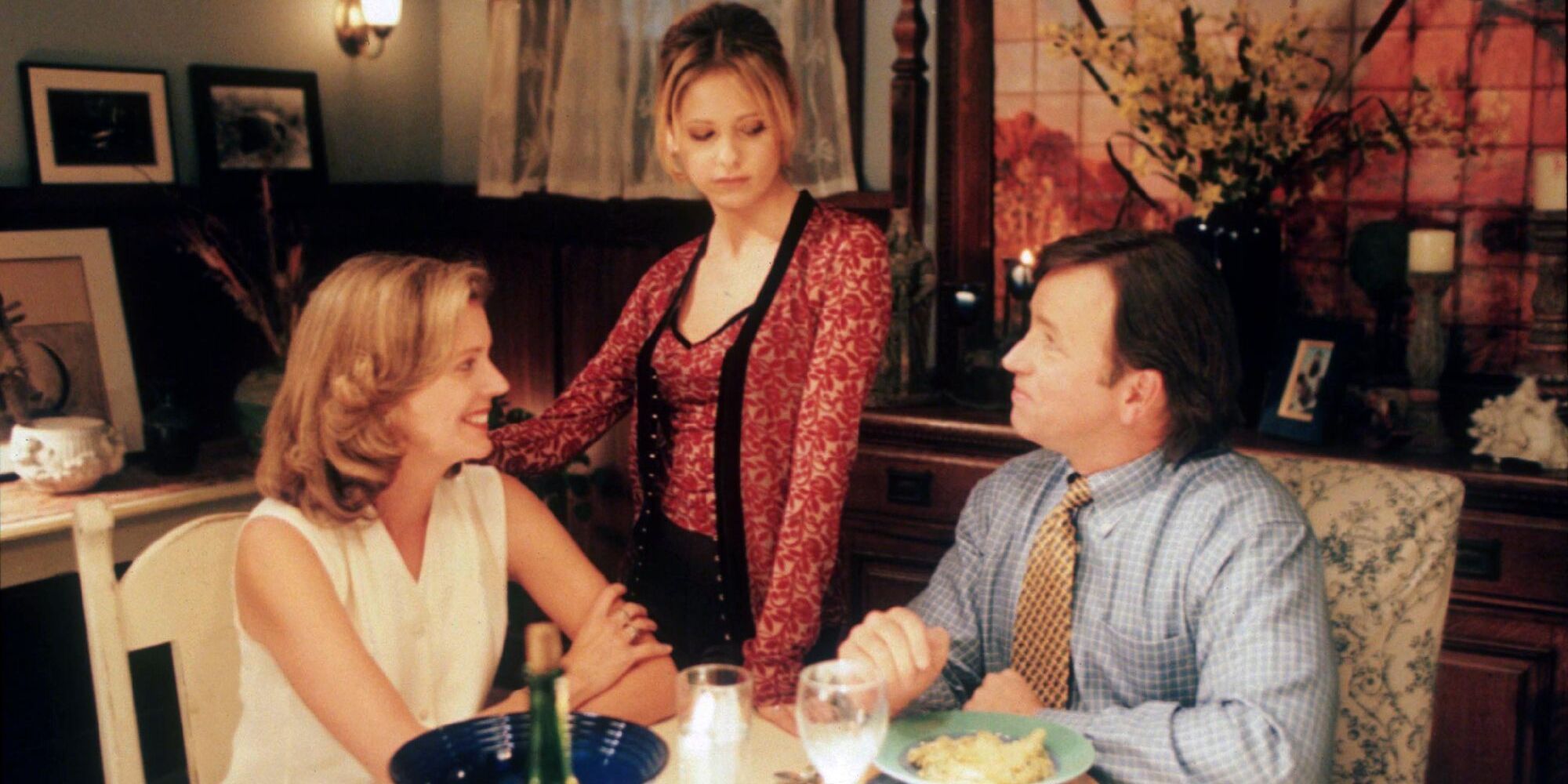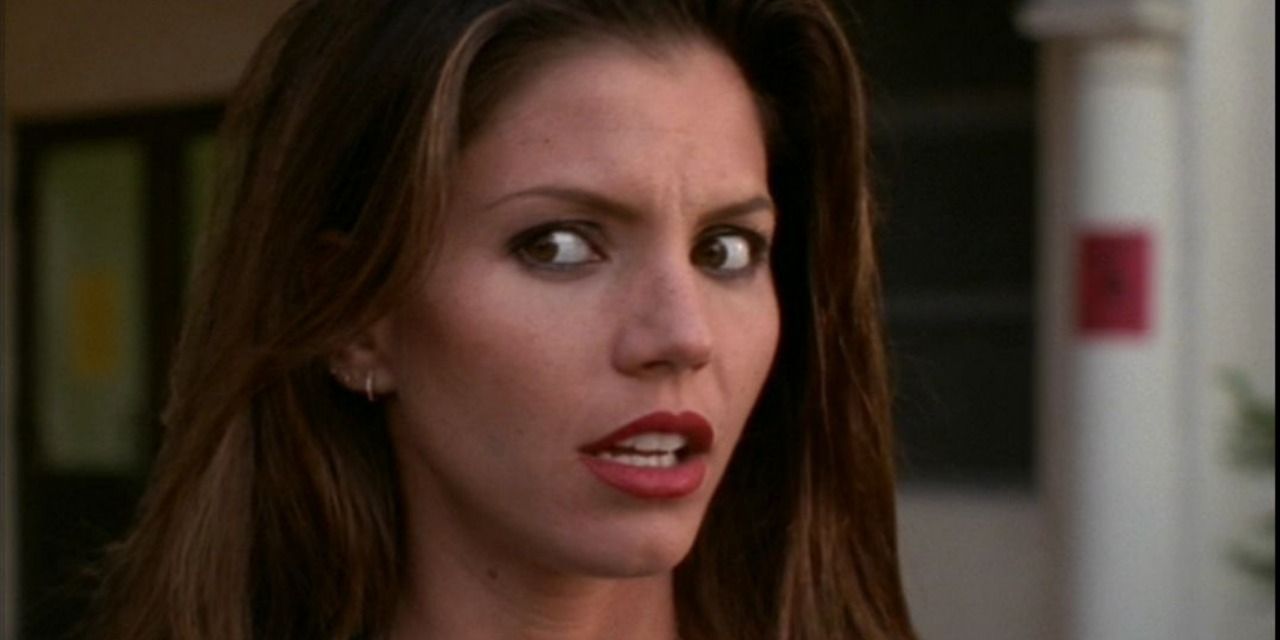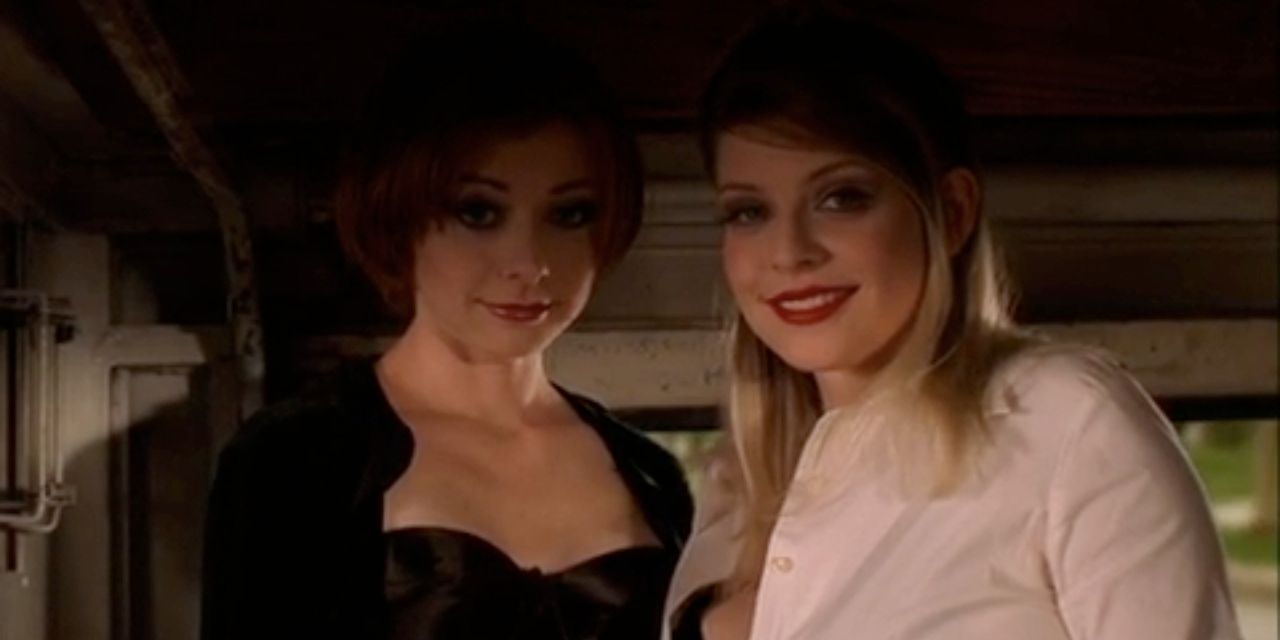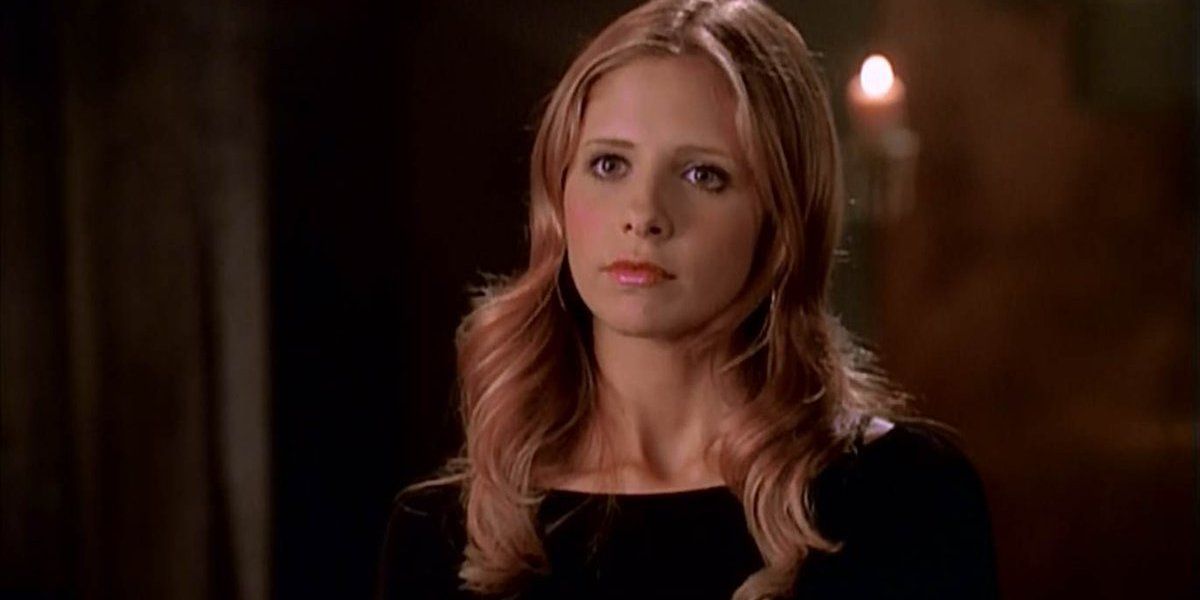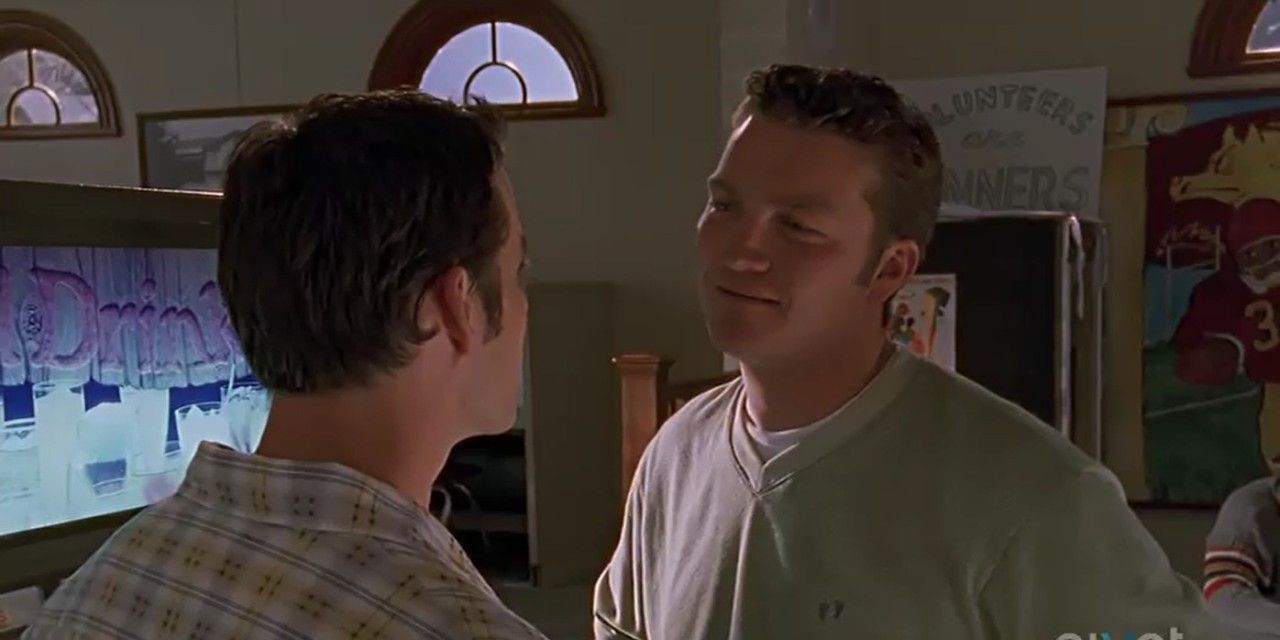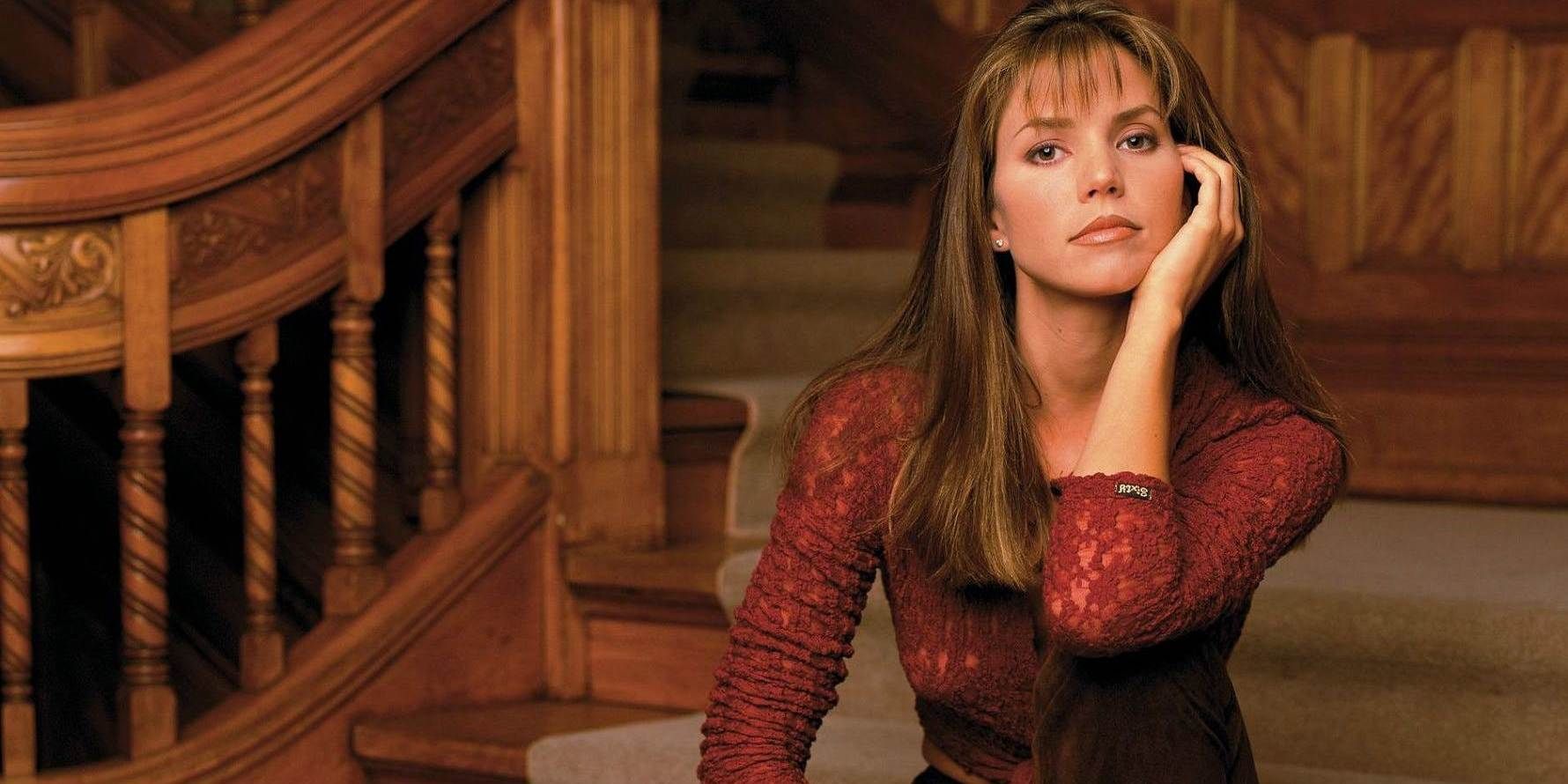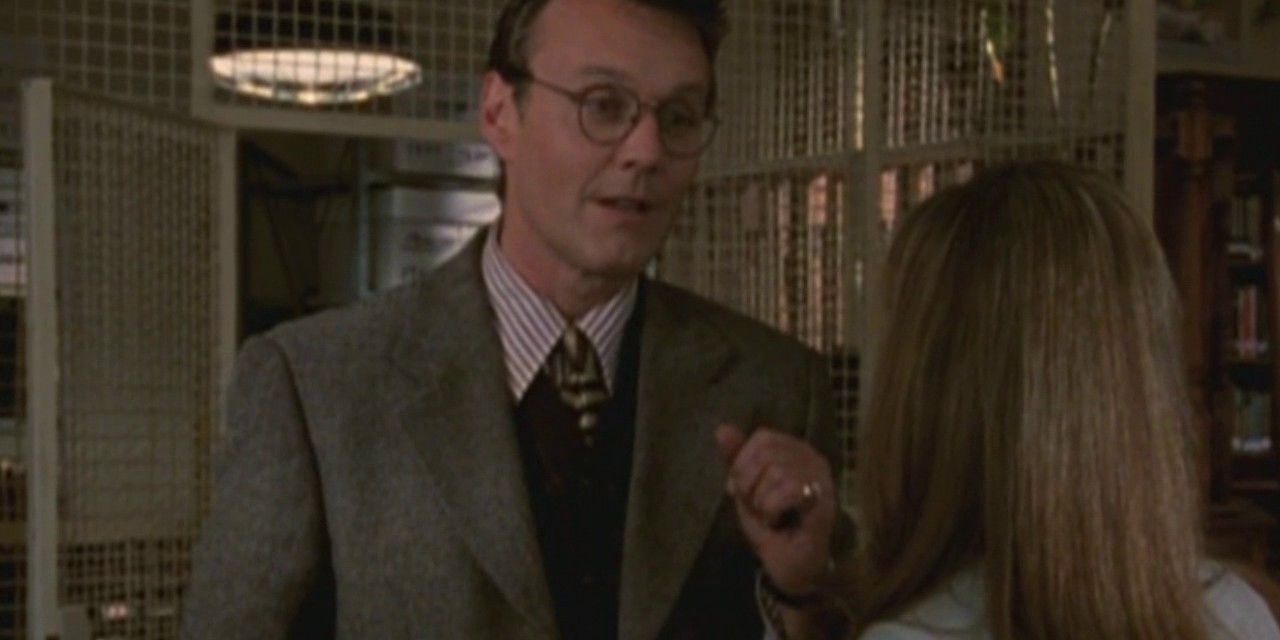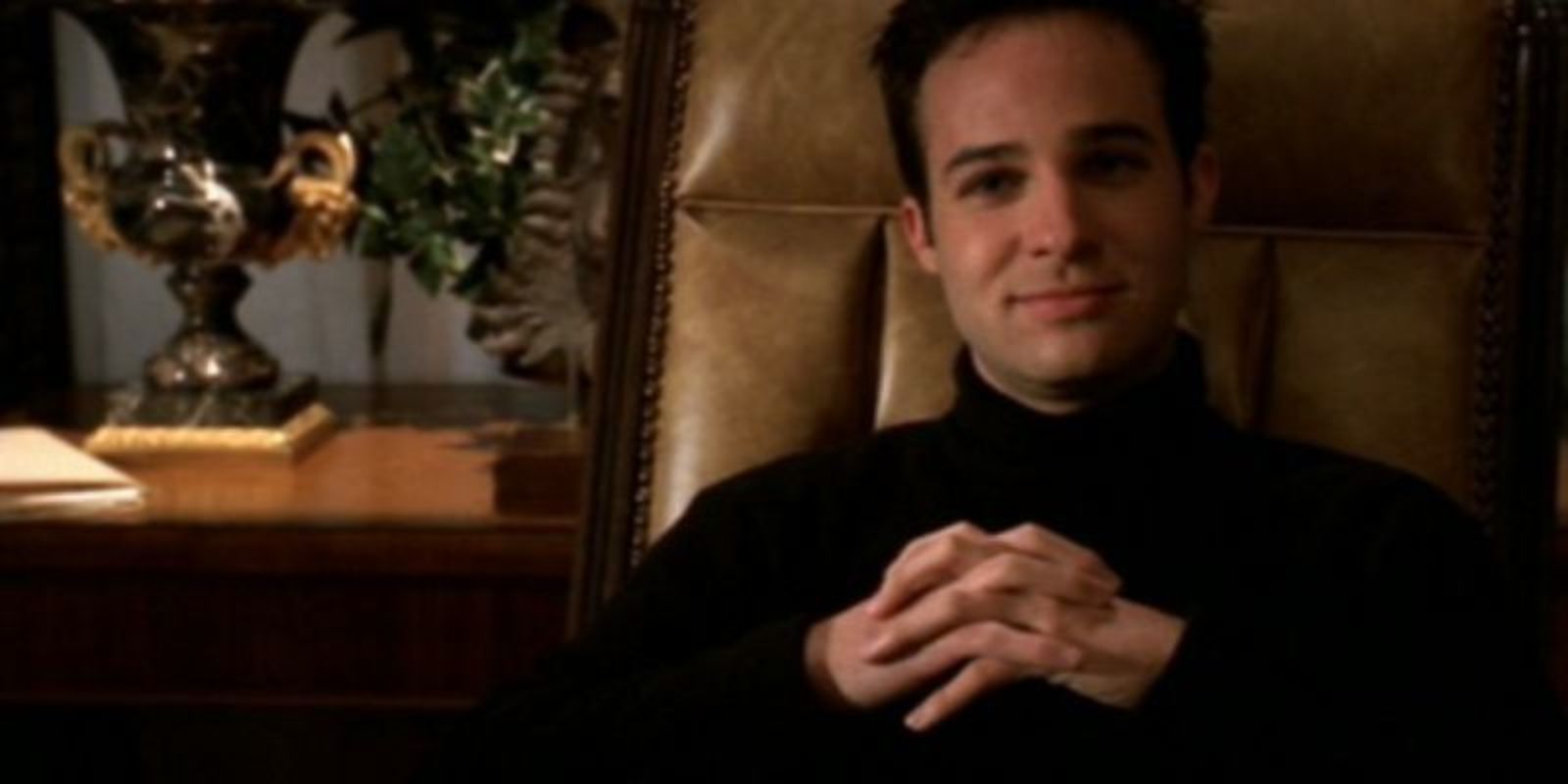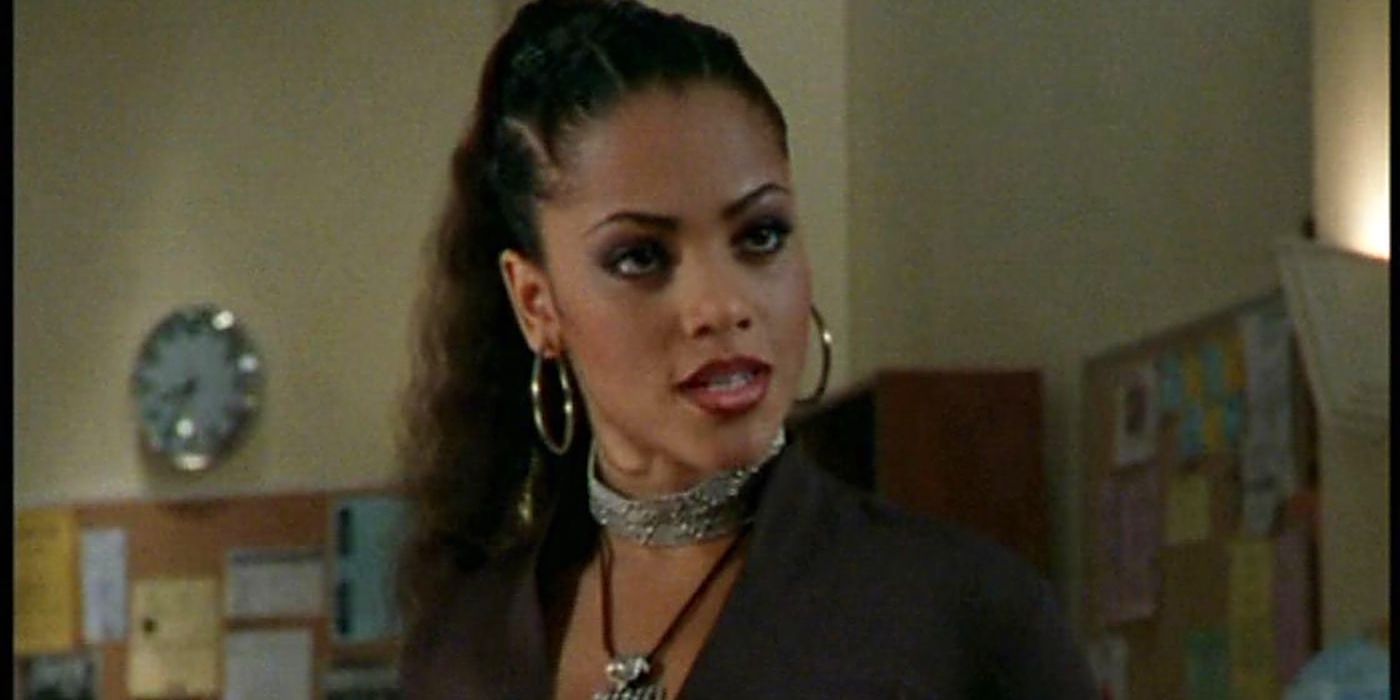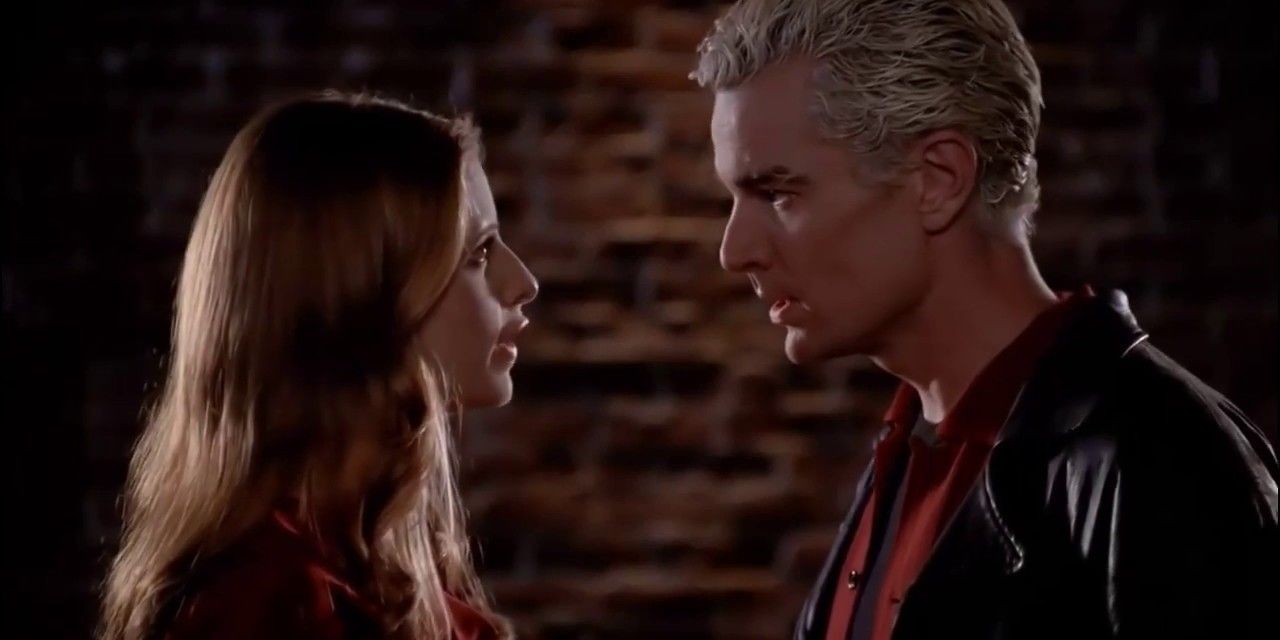It's impossible to discuss groundbreaking, progressive TV shows without including Buffy the Vampire Slayer. The series has been lauded for its feminist elements, not just because it features a strong, butt-kicking protagonist, but for its exploration of female friendships, sexuality, and agency. Buffy has also been regarded for its queer positivity, being the first network series to ever depict a lesbian sex scene.
While Buffy may have been ahead of its time, the show premiered over 20 years ago. Much of its plot and character development is universal and stands the test of time. But, like its early days CGI, some aspects of the show just don't hold up when viewed through present-day eyes. Society has changed a lot since Buffy and even for a forward-thinking show, it sure has its share of cringeworthy moments. Here are 10 storylines from Buffy the Vampire Slayer that have aged poorly.
Ted
Fans will remember "Ted" as one of Buffy's strongest filler episodes. Ted, played by the late, great John Ritter, is Joyce's hyper-perky boyfriend who turns out to be a hyper-murderous robot. Watching Buffy go toe to toe with a beloved TV legend is all kinds of wicked fun.
So what's the problem? True, "Ted" is a thrilling, escapist hour of television, but there's a fly in the popcorn. During a verbal confrontation, Ted threatens to hit Buffy. She relays this to Joyce who not only brushes her daughter off, but insists that Buffy's lying. Sure, Joyce was under the influence of Ted's "happy cookies" but she wasn't too stoned to process thought. It's an unflattering, offensive portrait of a single mom, so desperate to keep a man she dismisses abuse allegations made by her own kid. Moreover, today's society gives much more credibility to survivors who bravely speak out against their abuse. Joyce would be absolutely vilified for trying to silence Buffy.
Catty Cordy
Cordelia Chase ruled Sunnydale High with an iron fist. But while she never actually attacked with said fists, Cordy's assaults were of the verbal variety. Generally, her name-calling was pretty generic: "loser," dork," etc. Mean, yes, but not alienating to a group or community.
However, one instance sees Cordelia's teasing going too far. When Xander is confronted with a demon and flees the scene, Cordy's response is, "Say it. You ran like a woman." Really? First of all, doesn't Cordelia realize that she's surrounded by women who put themselves in danger every day trying to save the world? Running like Buffy, for example, means running at a demon whom everyone else is running from. Second, even today, the easiest way to insult a man is to compare him to a woman. As sad as that is, it's doubtful that a current show would allow for such a demeaning diss.
Xander’s lesbian fantasy
Willow and Tara are queer TV icons. They are wholly rounded characters, completely void of stereotype, and their relationship is a fan favorite. That's what makes it such a bummer when they appear as tarted-up sex objects in Xander's dream. In it, they wiggle around in revealing outfits and coquettishly invite Xander to join them in the back of an ice cream truck.
It's totally believable that Xander would have a dream like this. But lesbianism for male pleasure is as tired as it is vexing. Though TV today could still do better, it boasts a plethora of queer characters when compared to the early twentieth century. But back in 2000, Willow and Tara were some of the only few. There's a world of content out there catering to straight male fantasies; leave Willow and Tara out of it.
Buffy the Self Esteem Slayer
Buffy Summers is a valiant defender of the underdog. Not only does she protect Sunnydale citizens against demons of various ilk, Buffy is ready and willing to slay any high school bully—metaphorically speaking, of course. But nobility aside, Buffy has been known to hurl the occasional body-shaming barb, particularly at other females. She mocks vampire Darla's wrinkled face and tells a cute boy that, "Cordelia's hips are wider than I thought!" When asked if she would consider taking Jonathan to prom, Buffy laughs the notion off because, "He's like three feet tall." Yes, this is the same episode that found Jonathan almost committing suicide because of merciless teasing.
Nobody wants Buffy to be perfect. That would be boring. But her destructive comments aren't portrayed as character flaws; they're meant to be funny. In 2019, no one's laughing.
Larry’s sexuality
Though Willow may be the most well-known, she wasn't Buffy's first gay character. It was Larry, the chauvinistic jock and Xander's tormentor. We learn that Larry's boorish behavior is his attempt at covering up the truth. One scene finds Xander confronting Larry in the locker room for something completely unrelated. But due to a misunderstanding, Larry thinks Xander is coming out to him and in turn, comes out as well.
Xander is understandably shocked. But that shock gives way to icky fear as Xander makes it clear he can't get out of that locker room fast enough. The rest of the episode finds Xander paranoid about rumors of him being gay, which is meant to be comic relief. Society in the '90s made it much harder for queer kids to come out, so both Xander and Larry's fear make sense. But the show blew a golden opportunity to turn Larry's sexuality into a hopeful, pioneering storyline. Instead, they made it a punchline.
Slut-shaming Cordelia
Once upon a time, Cordelia had nasty comments for everyone she encountered; it's only natural she would be met with a few comebacks. Buffy, Xander, and Willow all have justifiable motive for verbal vengeance, but it's disturbing that 90% of their digs boil down to the lowest common denominator.
Cordelia may be the Queen of Mean, but her best trait is that she goes after what or who she wants, whether it's a new dress or the quarterback. By the Scooby Gang calling her names like "vapid whore" or "skanky ho," they're telling impressionable young viewers that these comments are a-okay to make and, in fact, funny. And they're also saying that women who embrace their sexuality deserve what they get. Cordy sure doesn't deserve this and neither does anyone else.
Boys will be boys
This has to be the most dangerous cliché of all time. It implies that menacing behavior is normal in young men and it also dismisses any traumatic effect that behavior may have on others, often women. Thankfully, this expression is considered dated by today's standards.
But in 1997, the belief was alive and well. When Xander gets possessed by the spirit of a hyena, he begins to act in increasingly predatory ways. Buffy and Willow bring their concern to Giles, who all but rolls his eyes. Though Giles doesn't actually say "boys will be boys", that's clearly his stance. Not long after, the possessed Xander tries to sexually assault Buffy. Maybe if Giles had believed the girls, he could have prevented this from happening. It's out of character for a man who is otherwise sensitive and sympathetic. If aired today, there's no way a respected authority figure like Giles would be this flip about a serious situation.
Superstar Jonathan
For most of the series, Jonathan is the lovable nerd who exists on the fringes and who fans feel sorry for. When he's not bullied, he's ignored. In Season 4's "Superstar", Jonathan casts a spell in which everyone thinks he's an international superhero. Perks of his status include being the leader of the Scoobies, living in a sweet mansion, and having a pair of blonde, beautiful twins to occupy his bed.
After the spell breaks, the Scoobies are angry at having been manipulated by Jonathan. They have a right to be...but what about the twins? Jonathan says they moved out, so they clearly weren't part of the spell; these women are actual human beings who Jonathan took advantage of. It's magical rape by deception, plain and simple. Later in the series, Jonathan joins the Trio and they perform a similar spell. So Jonathan isn't the sweet geek you remember; he's a serial predator who belongs in jail.
Kendra
One of the biggest Buffy criticisms stems from its lack of racial diversity. The first major non-white character comes in the form of Kendra, another Slayer. Famous for her bizarre accent, a constant source of ridicule and anger in the fan community. Is it Jamaican? Irish? It sounds like an offensive Caribbean impression performed by somebody drunk at a party.
This is hardly actress Bianca Lawson's fault. Kendra originally didn't have an accent, and this was an eleventh hour change. It's an unfortunate one, and contributes to the overall other-ing of her character. This is stoked even further by Buffy's insensitive comments. Sure, Buffy's an only child who's none too pleased to have another Slayer in town. But her mimicry of Kendra's accent is beyond inappropriate. and embarrassing, not just for the hero of the show, but the show itself.
Spuffy
Buffy and Spike's relationship has been glorified as a love affair for the ages, when it's actually a toxic nightmare. Later seasons find Spike transforming from vicious mercenary to the pervert next door, stealing Buffy's panties and even commissioning the horrific Buffybot.
Eventually, real Buffy succumbs to Spike and they carry on a sexual relationship brimming with mutual emotional abuse. This all culminates in the most unnecessary, disturbing moment of the show in which Spike tries to rape Buffy. Next season, he's back with the Scoobies as if nothing ever happened. In the series finale, Buffy even tells Spike she loves him. Not that we're Team Angel, but given the evidence, nobody should be Team Spike.

